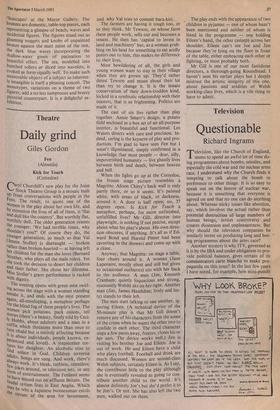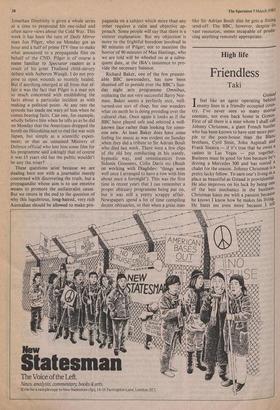Television
Questionable
Richard Ingrams
Television, like the Church of England,
I seems to spend an awful lot of time do- ing programmes about bombs, missiles, and especially the cold war and the nuclear arms race. I understand why the Church finds it tempting to talk about the bomb in preference to other things. It is so easy to speak out on the horror of nuclear war, because it is something that everyone is agreed on and that no one can do anything about. Whereas sticky issues like abortion, say, which involves the actual rather than potential destruction of large numbers of human beings, invites controversy and creates dissension and unpleasantness. But why should the television companies be similarly intent on producing long and bor- ing programmes about the arms race?
Another mystery is why ITV, governed as it is by the IBA and under obligation to pro- vide political balance, gives certain of its commentators carte blanche to make pro- paganda on this issue? In the last few years I have noted, for example, how mini-pundit
Jonathan Dimbleby is given a whole series at a time to propound his one-sided and often naive views about the Cold War. This week it has been the turn of Daily Mirror man Jon Pilger, who on Monday got an hour and a half of prime ITV time to make what amounted to a propaganda film on behalf of the CND. Pilger is of course a name familiar to Spectator readers as a result of his great Thailand child-slavery debate with Auberon Waugh. I do not pro- pose to open wounds so recently healed. But if anything emerged at all from that af- fair it was the fact that Pilger is a man not so much concerned with establishing the facts about a particular incident as with making a political point. At any rate the episode has made me wary of him when he comes bearing facts. Can one, for example, wholly believe him when he tells us as he did on Monday that the Americans dropped the bomb on Hiroshima not to end the war with Japan, but simply as a scientific experi- ment; or that an unnamed Ministry of Defence official who lent him some film for his programme said jokingly that of course it was 15 years old but the public wouldn't be any the wiser?
These questions arise because we are dealing here not with a journalist merely concerned with discovering the truth, but a propagandist whose aim is to use emotive means to promote the unilateralist cause. But we return in the end to the question of why this lugubrious, long-haired, very rich Australian should be allowed to make pro-
paganda on a subject which more than any other requires a calm and objective ap- proach. Some people will say that there is a sinister explanation. But my objection is more to the frightful boredom involved in 90 minutes of Pilger; not to mention the horror of 90 minutes of Max Hastings, who we are told will be wheeled on at a subse- quent date, at the IBA's insistence to pro- vide the necessary balance.
Richard Baker, one of the few present- able BBC newsreaders, has now been shunted off to preside over the BBC's Sun- day night arts programme Omnibus, replacing the not very successful Barry Nor- man. Baker seems a perfectly nice, well- turned-out sort of chap, but one wonders what on earth he is doing presiding over the cultural chat. Once again it looks as if the BBC have played safe and selected a well- known face rather than looking for some- one new. At least Baker does have some feeling for music as was evident on Sunday when they did a tribute to Sir Adrian Boult who died last week. There were a few clips of the old boy conducting in his stately, hypnotic way, and reminiscences from Sidonie Goossens, Colin Davis etc (Boult on working with Diaghilev: 'things went well once I arranged to have a row with him about once a fortnight'). This was the first time in recent years that I can remember a proper obituary programme being put on, but it was still a pretty scrappy affair. Newspapers spend a lot of time compiling decent obituaries, so that when a great man like Sir Adrian BouIt dies he gets a fitting send-off. The BBC, however, despite its vast resources, seems incapable of produ- cing anything remotely appropriate.















































 Previous page
Previous page